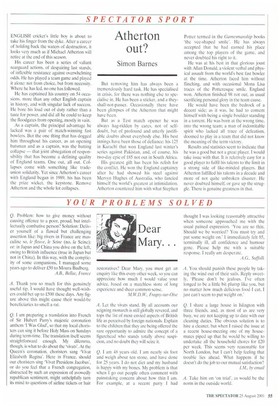Atherton out?
Simon Barnes
ENGLISH cricket's little boy is about to take his finger from the dyke. After a career of holding back the waters of destruction, it looks very much as if Michael Atherton will retire at the end of this season.
His career has been a series of valiant rearguard actions, of despairing last stands, of inflexible resistance against overwhelming odds. He has played a team game and played it alone: not from choice, but from necessity. Where he has led, no one has followed.
He has captained his country on 54 occasions, more than any other English captain in history, and with singular lack of success. He bore his load out of duty rather than a taste for power, and did all he could to keep the floodgates from opening, mostly in vain.
As a captain, the principal advantage he lacked was a pair of match-winning fast bowlers. But the one thing that has dogged him throughout his career, as an opening batsman and as a captain, was the batting collapse — that joint abnegation of responsibility that has become a defining quality of England teams. One out, all out. Collapses come with something like tradeunion solidarity. Yet since Atherton's career with England began in 1989, his has been the prize wicket, the keystone. Remove Atherton and the whole lot collapses. But removing him has always been a tremendously hard task. He has specialised in crisis. for there was nothing else to specialise in. He has been a sticker, and a theyshall-not-passer. Occasionally there have been glimpses of the Atherton that might have been.
But as a Test match opener he was always hag-ridden by cares, not of selfdoubt, but of profound and utterly justifiable doubts about everybody else. His best innings have been those of defiance: his 125 in Karachi that won England last winter's series against Pakistan, and, of course, his two-day epic of 185 not out in South Africa.
His greatest gift has been his relish for the conflict. He won the England captaincy after he had showed his steel against Mervyn Hughes of Australia, who fancied himself the world's greatest at intimidation. Atherton countered him with what Stephen Potter termed in the Gamesmanship books 'the vec-shaped smile'. He has always accepted that he had earned his place among the top players of the game, and never doubted his right to it.
He was at his best in that glorious joust with Allan Donald, a violent verbal and physical assault from the world's best fast bowler at the time. Atherton faced him without flinching, and with occasional Mona Lisa traces of the Potteresque smile. England won. Atherton finished 98 not out, as usual sacrificing personal glory in the team cause.
He would have been the bedrock of a decent side; as it was, he had to content himself with being a single boulder standing in a torrent. He was horn at the wrong time, into the wrong team; a man of indomitable spirit who lacked all trace of defeatism, doomed to play in a team that did not know the meaning of the term victory.
Results and statistics seem to indicate that he was a good but not a great player. I would take issue with that. It is relatively easy for a good player to fulfil his talents to the limit in a strong side of like-minded players. But Atherton fulfilled his talents in a decade and more of not quite unbroken disaster. He never doubted himself, or gave up the struggle. There is genuine greatness in that.


























































 Previous page
Previous page